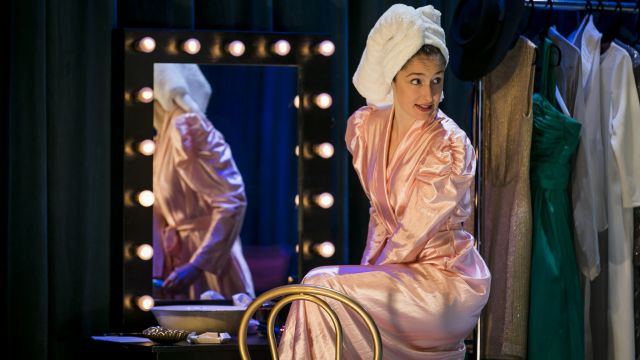The Rover
For a 1677 play, The Rover feels very modern. Written by Aphra Behn, one of the first women in England to make money from writing, this is a comedy that’s brave, brash, and very funny. On top of that, Eamon Flack has given the look, feel and many of the lines in this production a contemporary edge. Together with a wonderful cast, he’s done a brilliant job.
Nikki Shiels swashes onto the stage and nails the play’s opening monologue. She plays the playwright herself, framing the play within a feminist setting. But by feminist, she is not too serious. The women here are feisty, fun and full of life.
Even though this play is ostensibly about a group of English playboys in Naples, the women lead the action and the men follow. Shiels also plays the courtesan, Angellica Bianca, whom even while chasing a love matches - and usually exceeds - the subject of her attention. That subject is the rover himself, Willmore, played by the actor here with the main billing: Toby Schmitz. He’s played a similar part before and it’s clear such roles are made for him. You can see why various women fall for him.

The ensemble is very good but two brilliant comic actors stand out. Megan Wilding is the only nod to diversity in a very white cast (there’s a joke about that), an indigenous actor who’s also making a name for herself as a playwright. No matter how good her writing is, I plead with her to pursue a career on the stage too. She plays two parts - Moretta and Lucetta - and her delivery is hilarious.
And then there’s Gareth Davies, playing the foppish English country gentleman Blunt. Davies is the master of the play’s physical jokes, his verbal gags are pitched perfectly as well - and yet his character sympathetic. When Blunt is stripped down to red boxer trunks and disgraced by a wench, the audience vocalises its pity.
This is an incredibly physical production, with lots of sword-fighting, people chasing each other off and on stage, and many of the lines feats of interplay too. Movement director Scott Witt deserves a lot of credit.
The adaptation of this play is probably a little too long - it runs close to three hours, although it doesn’t drag. Nonetheless, there are opportunities for cuts.
But at a time when so many reimaginings of classic works miss their mark, Flack and his team show how it should be done.
Peter Gotting
Photographer: Anna Kucera

Subscribe to our E-Newsletter, buy our latest print edition or find a Performing Arts book at Book Nook.

